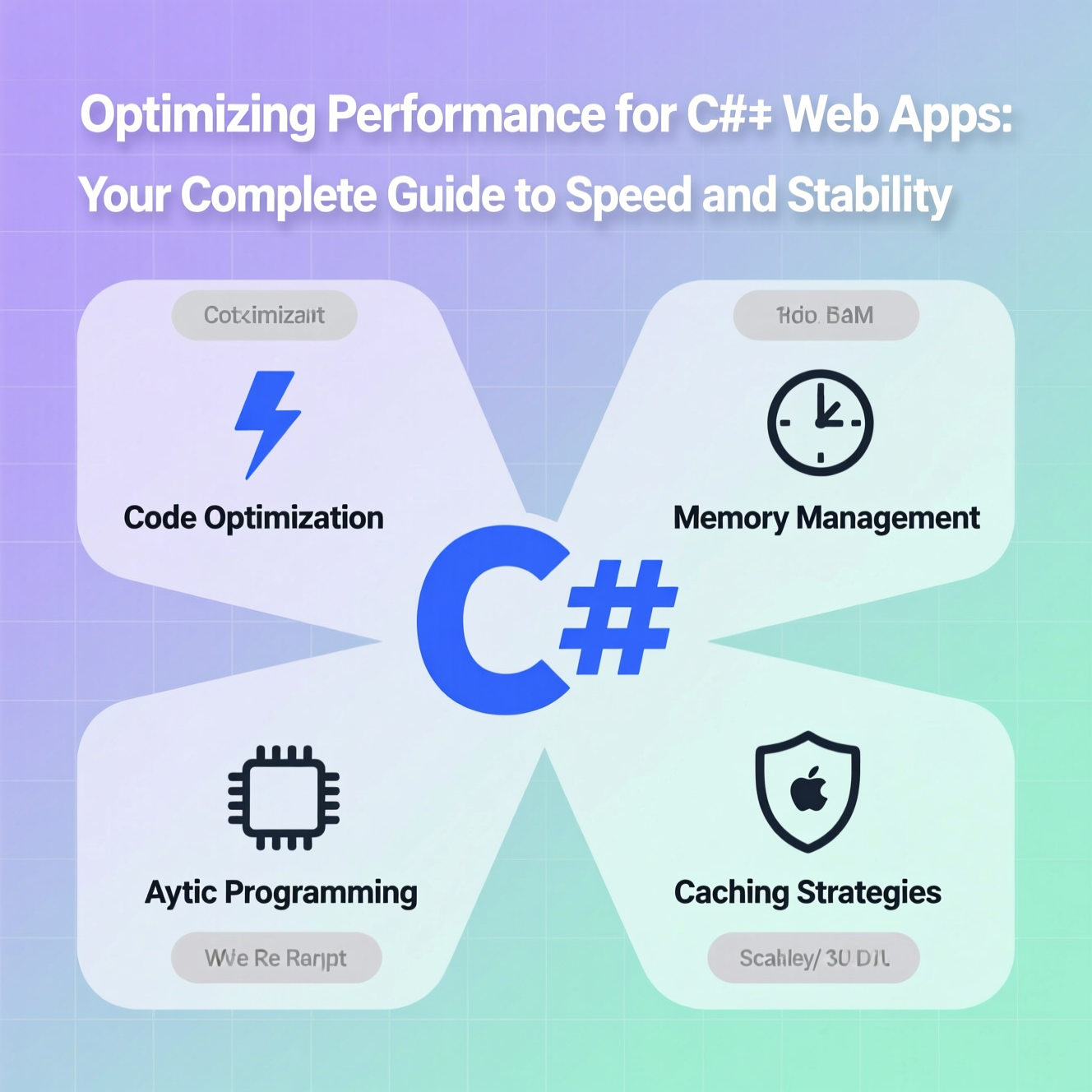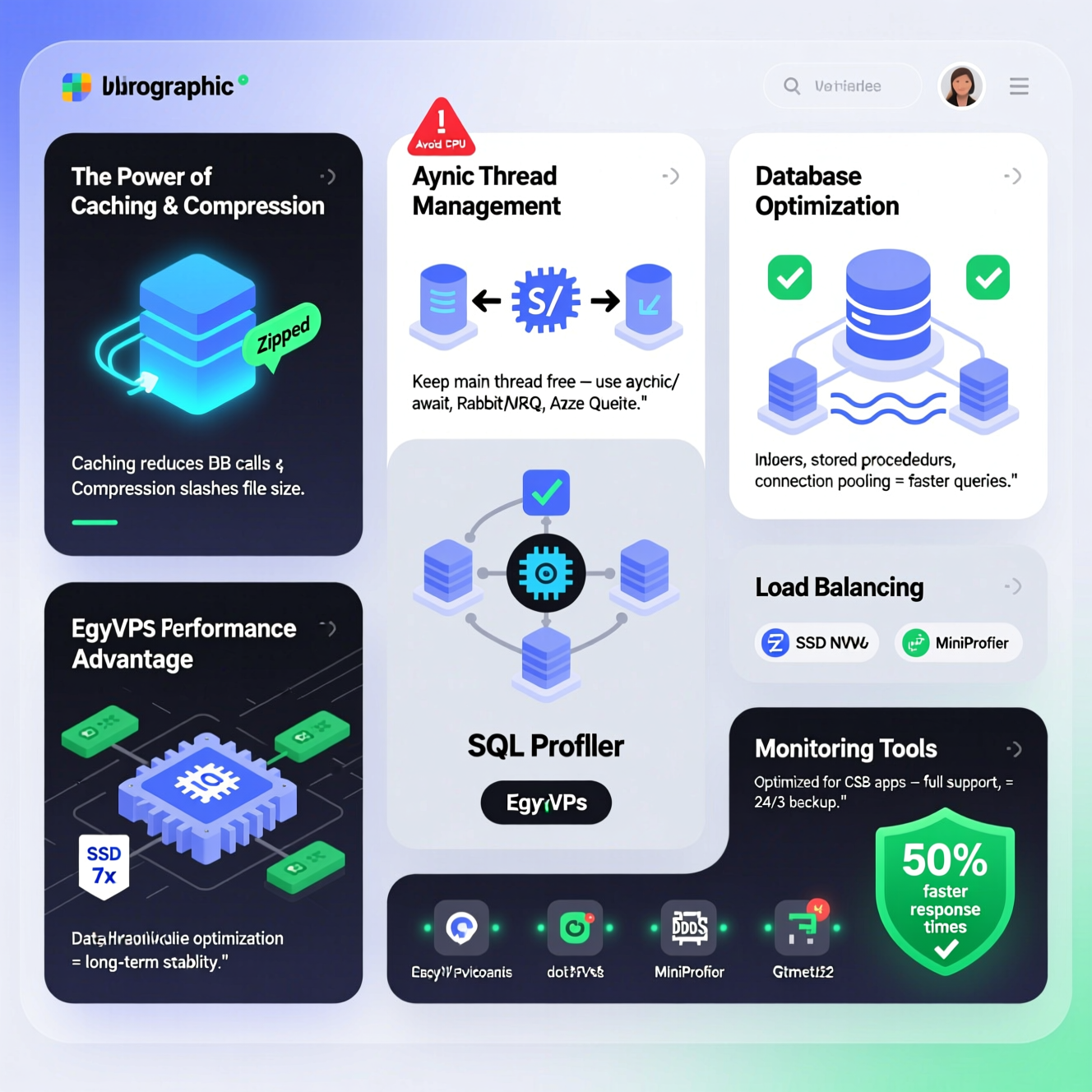Boost loading speed, reduce memory usage, and enhance server performance with smart configurations.
EgyVPS Windows Hosting offers SSD NVMe servers designed for top-tier performance and reliability.
Once your C# or ASP.NET application is live, the real challenge begins — maintaining speed, scalability, and stability under real-world conditions.
A fast, responsive app not only improves user experience but also boosts SEO rankings and customer trust.
In this guide, we’ll walk you through the best techniques to optimize C# web app performance, and show how EgyVPS Windows Hosting provides the perfect environment to keep your applications running at peak efficiency.

Caching and compression are the foundation of performance optimization.
Caching stores frequently requested data in memory, reducing database calls, while compression minimizes file sizes to speed up data transfer.
✅ Best practices:
Use MemoryCache or DistributedCache for ASP.NET apps.
Enable GZIP or Brotli compression in IIS or Nginx.
Implement CDN caching for global speed improvements.
These techniques can reduce response times by up to 50%, directly impacting user satisfaction.
C# offers powerful asynchronous capabilities that prevent your app from blocking main threads during heavy operations.
Mismanagement of threads can lead to CPU overload and slow response times.
✅ Optimization tips:
Use async/await properly to keep your app responsive.
Avoid running CPU-heavy tasks on the main thread.
Monitor thread performance using Visual Studio Profiler.
Offload background tasks using message queues like RabbitMQ or Azure Queue Storage.
Proper threading can significantly improve concurrency and reduce latency in high-traffic environments.
Your database is the backbone of your application. Poorly optimized queries are among the top causes of slow performance in C# web apps.
✅ Optimization checklist:
Use indexes on frequently queried columns.
Avoid unnecessary joins and heavy queries.
Enable connection pooling to reduce overhead.
Use Stored Procedures for complex operations.
Monitor performance using SQL Profiler or MiniProfiler.
Efficient database design ensures faster data access and smoother overall app performance.
When your traffic grows, one server might not be enough.
That’s where load balancing comes in — distributing traffic across multiple servers to maintain stability and uptime.
✅ Scaling strategies:
Use Nginx or HAProxy as load balancers.
Implement auto-scaling in cloud environments.
Monitor CPU, RAM, and response times regularly.
Choose a hosting provider that supports horizontal scaling — like EgyVPS.
With proper scaling, your app can handle thousands of concurrent users without downtime.
EgyVPS takes performance to the next level with modern infrastructure optimized for C# and ASP.NET applications.
Their hosting plans use SSD NVMe drives, which deliver read/write speeds up to 7x faster than traditional SSDs.
✅ Key performance features:
Intel Xeon processors for maximum processing power
DDR4 RAM for faster memory handling
Built-in DDoS protection and smart firewall
Full .NET 8 and SQL Server 2022 support
24/7 technical support and automated backups
Whether you’re running a small web app or a large enterprise solution, EgyVPS ensures consistent speed, security, and uptime.
Before you optimize, you need to analyze.
Monitoring your app’s performance helps identify bottlenecks and optimize effectively.
✅ Recommended tools:
Application Insights – for real-time performance monitoring
dotTrace – for CPU and memory profiling
MiniProfiler – for database query tracking
GTmetrix or Pingdom – for load-time analysis
Data-driven optimization is the fastest way to achieve long-term performance stability.

Optimizing C# web applications is not a one-time task — it’s an ongoing process.
By implementing caching, compression, async processing, and load balancing, you’ll ensure your app delivers an exceptional user experience.
And with EgyVPS Windows Hosting, you get the perfect platform — combining NVMe-powered performance, robust security, and expert support tailored for C# and ASP.NET environments.
1. Can I improve performance without changing my code?
Yes. Server-side optimizations like caching, compression, and database indexing can dramatically improve performance.
2. What’s the difference between local and distributed caching?
Local caching stores data on a single server, while distributed caching shares it across multiple servers for better scalability.
3. Is regular Windows hosting suitable for ASP.NET apps?
Not always — it’s better to use specialized EgyVPS Windows Hosting, optimized for .NET performance and security.
4. Why does SSD NVMe matter for performance?
NVMe drives offer 5–7x faster read/write speeds than traditional SSDs, cutting page load times drastically.
5. When should I consider load balancing?
If your app experiences traffic spikes or slow response times, load balancing ensures stability and uptime under pressure.
هل تحتاج إلى Windows VPS سريع وآمن وبسعر مناسب؟
شركة EgyVPS بتوفرلك سيرفرات ويندوز جاهزة للاستخدام فورًا.
? تواصل معنا عبر: 201001197157
? أو زور موقعنا: https://egyvps.com